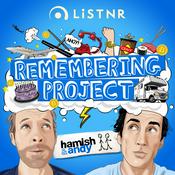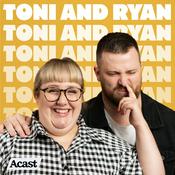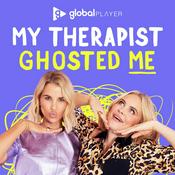49 episodes

IV Nutrient Therapy
09/01/2026 | 1h 15 mins.
We’re back from our December break with a hot-topic episode: a deep look into the research on IV nutrient therapy and whether you should partake in the currently hot trend.Guest host Amanda Jones and Victoria discuss: * The history of IV therapy, including its start in conventional medicine and the connection to orthomolecular medicine* The role of Linus Pauling and Dr. John Myers (more on him here) in promoting the popularity of ingesting large doses of nutrients and the Myers’ IV Cocktail* The IV torch was passed to Dr. Alan Gaby (author of Nutritional Medicine), who continued the tradition and research of IV nutrient therapy * Who might benefit most from IV therapy, and possible concerns when nutrients are used as drugs * Amanda’s experience with IV magnesium therapy during labor when she had pre-eclampsia * How IV nutrients made their way into spa/aesthetic/influencer culture, and the way these nutrients are spoken about in a way that sounds “medical-y” but won’t attract the ire of the FDA* Are IV spas safe? Amanda and Victoria discuss possible risks* Some concerns include a lack of randomized research, the possibility of the placebo effect, contaminants such as heavy metals or microplastics (we found multiple studies on this 😬), bypassing the stomach and first pass metabolism, individual reactions to the nutrients (such as heart arrhythmias), vitamin and antioxidant overload, medication interactions, allergic reactions, etc.* Situations when the possible benefits of IV nutrients likely outweigh the risks* The conflation of aesthetics and looking a certain way with being healthy This is a public episode. If you would like to discuss this with other subscribers or get access to bonus episodes, visit influencedtodeath.substack.com

Episode #48: Urine therapy
24/11/2025 | 1h 13 mins.
In this episode, Amanda and Victoria discuss the growing popularity of urine therapy, fueled by social media personalities who use their pee for lotion, sunscreen, mouthwash, and mocktails.They cover:* Their own health adventures, including a short stint of urine therapy for Amanda* The history of urine therapy, including a (highly likely) misinterpretation of the Biblical Proverb 5:15* The limited mentions of urine therapy in Traditional Chinese Medicine (qiushi) and Vedic texts (Shivambu Kalpa) that have been referenced by modern enthusiasts* What, exactly, is in pee* The claim that there are stem cells in urine (referenced studies are here and here)* Is fermented urine the way to go? Seems not if stem cells are what you’re after. :( * “Studies suggest that preserved 24 h urine samples provide around 140 viable USCs, while fresh urine offers a significantly higher yield of three to seven USC clones per 100 ml.” * The inaccurate idea that we’re able to convert the nitrogen or urea in urine into nitric oxide. * Kidneys’ role as detoxifying organs; they excrete mercury and other toxic metals via…urine This is a public episode. If you would like to discuss this with other subscribers or get access to bonus episodes, visit influencedtodeath.substack.com

Episode #47: Lean Mass Hyper-Responders
02/11/2025 | 1h 13 mins.
In this episode, Victoria & guest co-host Amanda Jones get to speak with John O’Connor, founder of Gene Food, Integrative Health Coach, and all-around excellent thinker.Today’s primary topic is lean mass hyper-responders (LMHR), a subset of lean people who, when they eat a low-carbohydrate, high-fat diet (LCHF), experience a massive increase in LDL cholesterol. Even though this group is relatively small, the concepts discussed apply to anyone interested in using a ketogenic or low-carb/high-fat diet, or any therapeutic diet (such as Carnivore, vegan, AIP, etc.), in a way that considers both the benefits and the risks.They cover:* Who are the lean mass hyper-responders and why you should care* Is unlimited saturated fat beneficial? Harmless? For everyone? * The KETO-CTA study* You can find critiques of the study on John’s website here and also a more technical but really excellent write-up from Alex Leaf here.* Saturated Fats and Health: A Reassessment and Proposal for Food-Based Recommendations: JACC State-of-the-Art Review* Why some people in the keto/low-carb community might be pushing so hard against the risk of elevated LDL cholesterol, and continue promoting and eating the diet* Some individuals are particularly sensitive to saturated fats…are you one of these people?* The multi-faceted risk of promoting the idea that there’s no risk of unlimited amounts of saturated fat intake, elevated LDL, and ApoB* Shoutout to Peter Attia and Dr. Tom Dayspring for their series The Straight Dope On Cholesterol* What’s the difference between LDL-C and ApoB?* Amanda gives a great explanation of why our ApoB levels matter in real life* The interesting way that plausible - but not proven - ideas can gain in popularity, even with highly educated audiences* The conversations over the KETO-CTA study outcomes and why, even in the face of black and white results, some people still skew the narrative* We discuss John’s ideas on reactivity and autoimmunity - Toxicant-induced loss of tolerance for chemicals, foods, and drugs: assessing patterns of exposure behind a global phenomenon (the paper he references)* The fallacy in focusing on mechanism (trying to track down the deep biochemistry of why something is happening) versus zooming out and focusing on the basics that we know work extremely well to improve healthA big thank you to John for coming on the show; we hope to have him on again soon! Be sure to check out Gene Food for real-world guidance on your genetic data. This is a public episode. If you would like to discuss this with other subscribers or get access to bonus episodes, visit influencedtodeath.substack.com

Episode #46: Public health vs. functional medicine
26/10/2025 | 9 mins.
This is a free preview of a paid episode. To hear more, visit influencedtodeath.substack.comIn this episode, Hannah & Victoria discuss what Hannah’s been learning in her first semester pursuing her Master’s in Public Health. Pretty often, we realize our off-mic conversations should be part of the show, so today we’re making it happen!This is a behind-the-scenes look at Hannah’s experience and her realization that public health and functional m…

Episode #45: MTHFR
22/10/2025 | 1h 45 mins.
In this episode, guest host Amanda Jones and Victoria speak with Sara Russell about the MTHFR gene (the gene that leads to the creation of the methylenetetrahydrofolate reductase enzyme) and the different variants that might (emphasis on MIGHT) impact your health.Be prepared before you dive in…this is a longer discussion that covers many aspects of MTHFR, both hypothetical (primarily what we’ve seen in influence-y spaces like social media) and actual (what we’ve read in research studies and seen in clinical practice).We discuss the role of MTHFR variants in autism spectrum disorders, infertility, and other diagnoses, as well as the use of methylated B vitamins versus folic acid and folinic acid.Some of the studies Amanda, Victoria, and Sara reference include: * Overview of MTHFR and variant biochemistry* Basic write-up on MTHFR variants from the CDC* Connection to autism - here, here, and here* The connection between one variant (C677T) and blood folate levels* Homocysteine in disease* Helpful overview of homocysteine and why low levels might also be problematic* The connection between homocysteine and infertility* Genetic Biomarkers of Metabolic Detoxification for Personalized Lifestyle Medicine* Adverse Effects of Excessive Folic Acid Consumption and Its Implications for Individuals With the Methylenetetrahydrofolate Reductase C677T Genotype* Homocysteine and Psychiatric Disorders* Slow overmethylation of housekeeping genes in the body mucosa is associated with the risk for gastric cancer* Active Folate Versus Folic Acid: The Role of 5-MTHF (Methylfolate) in Human Health* DNA methylation in cancer: too much, but also too little* Homocysteine Imbalance: a Pathological Metabolic Marker* Homocysteine metabolism as the target for predictive medical approach, disease prevention, prognosis, and treatments tailored to the person* Disturbed homocysteine metabolism is associated with cancer* Intake of Methyl-Related Nutrients and Risk of Pancreatic Cancer in a Population-Based Case-Control Study in Minnesota* Association of MTHFR C677T and A1298C Polymorphisms with First-Episode Myocardial Ischemia: A Case–Control Study* https://pmc.ncbi.nlm.nih.gov/articles/PMC3294042/* https://pmc.ncbi.nlm.nih.gov/articles/PMC5536672/* https://pubmed.ncbi.nlm.nih.gov/37187267/* https://reference.medscape.com/drug/leucovorin* https://pmc.ncbi.nlm.nih.gov/articles/PMC6346075/* https://pubmed.ncbi.nlm.nih.gov/22369260/* https://pubmed.ncbi.nlm.nih.gov/18355335/* https://pubmed.ncbi.nlm.nih.gov/6781067/* https://pubmed.ncbi.nlm.nih.gov/12566489/* https://pubmed.ncbi.nlm.nih.gov/10759136/ This is a public episode. If you would like to discuss this with other subscribers or get access to bonus episodes, visit influencedtodeath.substack.com
More Comedy podcasts
Trending Comedy podcasts
About Influenced to Death
Listen to Influenced to Death, Call Her Daddy and many other podcasts from around the world with the radio.net app

Get the free radio.net app
- Stations and podcasts to bookmark
- Stream via Wi-Fi or Bluetooth
- Supports Carplay & Android Auto
- Many other app features
Get the free radio.net app
- Stations and podcasts to bookmark
- Stream via Wi-Fi or Bluetooth
- Supports Carplay & Android Auto
- Many other app features


Influenced to Death
download the app,
start listening.
































